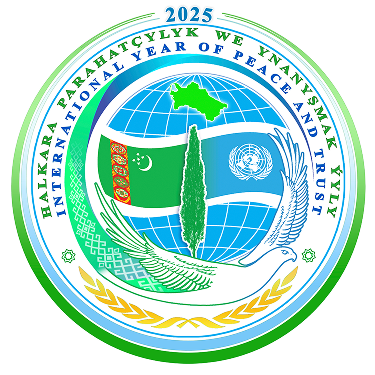People of science: A man from the book world

All fundamental changes in the culture of library in Turkmenistan for the last half of the century is related with the name of this man. Bold historian, who has broken a blank wall of obscurity around the whole system of problems related to historical past of Turkmen people, in particular to ancient and medieval written and book culture of our ancestors, who has drawn attention to Avesta as a founder of this culture, who has brought back old printed Turkmen books in Arabic language, all of these is Almaz Berdiyevich Yazberidyev.
Prominent scientists, bibliologist, library scientist and bibliographer of Central Asia, Doctor of History, Honoured Cultural Personnel of Turkmenistan Almaz Yazberdiyev was born in interesting family. In XIX century, his mother’s grandfather Say-Ahun was one of few educated people in mountain valleys of Western Kopetdag, in the birthplace of great Magtumguly. Having received education from village school in the Valley of Chendyr River, he was able to continue education in madrasah of Bukhara and Khiva. Having received the title of akhoond, he moved to the Keyikoy village in the north of Turkmenistan (Akdepe district, Dashoguz Region nowadays) where he built a madrasah and started to teach children. The madrasah, which clay walls remained until the end of the XX century, had a lot of book that he collected.
His grandson Almaz, who learnt reading early and read all books in school library, was born in the same village many years after. As he recollects now, the idea to dedicate his life to the books has come to his mind under impression of the book exhibition, which he occasionally saw, having visited Ashgabat after he graduated from the secondary school back in 1956.
It happened that after two years of study in Ashgabat Cultural Educational College, Almaz has entered Moscow State Institute of Culture where he received basic knowledge not only in special disciplines like bibliology, library science and bibliography but also in history, literature, philosophy. His tendency to creative works has been revealed in student days. Having received diploma, Almaz Yazberdiyev was sent to work to Central Scientific Library of the Academy of Sciences of Turkmenistan. Ever since, his life was closely related to this library.
There are only five records in labour book of the scientists: 1963 – Senior Bibliographer, 1965 – Head of Scientific and Bibliographic Department, 1967 – Deputy Scientific Director, 1973 – 2017 – permanent Director of the library for 44 years! Since September 1, 2017 and until now, Almaz Berdiyevich reaches in the department of library science and bibliography of Turkmen State Institute of Culture. Daily work of administrator but first, multi-skilled scientist who is fallen in love with books and devoted to them, is hidden behind brief lines of the biography.
Yazberdiyev has published his first scientific work named “From the history of bibliography of national printing media of Central Asian nations of the second half of XIX and first quarter of XX century” based on his candidate’s thesis in 1974. Books in Turkmen language, which were printed back then based on Arabic graphics, was the main subject of his studies. In the last century, Turkic speaking people of Central Asia, Volga Region, Northern Caucasus and Crimea had to change their alphabets for four times.
As is known, arabic graphics, which they use from ealry medieval period, was replaced with Latin alphabet in 1927 and cyrillic in 1940. After 1991, the return to Latin letters has started. In the result, new generations in these regions become completely separated from spiritual heritage of ancestors who used to write in their national languages using arabic script.
It is not surprise that under new conditions, the books in Arabic become available only for narrow circle of scientists knowing Arabic script while ordinary people had an opinion that there were no printing books in Turkmen language before 1017 Revolution. The scientist has found and described hundreds of books of classics of Turkmen literature, which used to be printed in Kazan, Istanbul, Tabriz, Lahore, Peshawar, Tashkent, Samarkand, Bukhara and other cities where the first printing shops appeared, in original language. Educated Turkmen population read these books in XIX and beginning of XX century and some rare samples remained until our days.
“Too much efforts and work were put for collection of truthful information about Turkmen books in Arabic script, - Almaz-aga says. – At the same time, working on chronological index, I was able to include only the tenth part of material that I had as many works were censored in soviet times as they were about religion and contained Sufi motifs. The index was published together with relative scientific essay under the name “Turkmen book in Arabic graphic” in 1981. It listed only 211 books, which were published before 1917. It was at least something after the years of full denying of their existence.
Against expectation of the author, the index raise a lot of attention not only in Turkmenistan but also beyond its borders. Entire circulation of 1,500 copies was bought vey fast. The colleagues have called the work of Almaz Yazberdiyev as true scientific achievement. However, despite positive feedbacks, he knew better what deficiencies, which were related to the reasons of objective character, the work has.
Twenty years after, when the situation has changed, Yazberdiyev has started again to search for old printed Turkmen books but this time more thoroughly. In the result, new fundamental work in Turkmen language “Oriental book printing and old printed Turkmen books” has been published. Number of registered Turkmen books, which were published before 1917, has increased seven times comparing with the index published in 1981, from 211 to 1,289.
In his work, Yazberdiyev has proven that issues of classification of national books printed in Arabic script can be sorted no matter how difficult it is. Uzbekistan, Tajikistan, Kyrgyzstan, Tatarstan, Bashkortostan and partially Kazakhstan are yet to solve this problem.
In 1993, A. Yazberdiyev has published monography “Publishing in pre-revolutionary Turkmenistan” where he gives the information about 268 books and 29 newspapers and magazines, which were published in Trans-Caspian Region in 1886 – 1917 in Russian language.
Last 30 years, the scientist study written monuments and history of books of the peoples living in our region from the beginning, which are traced by documentary materials. he summed up his researches in this sphere in several books. First, this is monography “Bibliography in ancient Central Asia (pre-Islamic period)”, which was published by the Academy of Science of Turkmenistan in 1995. In addition, A. Yazberdiyev has published number of articles in Turkmen language dedicated to written monuments of Parthian Empire, texts of Avesta, the holy book of Zoroastrians. He has translated “Videvat”, which is one of the most important parts of Avesta, to Turkmen language. This translation was published as a separate book by the General Archive Department under the Cabinet of Ministers of Turkmenistan.
He has also translated numerous scientific works and separate originals about bibliography from English to Turkmen and Russian languages. His own works were published translated to different languages in England, Iran, Pakistan, Italy, Turkey. Almost 20 years ago, his scientific monography “Old printed Turkmen Books”, which traces the history of printing of books of Turkmen authors in original language but using Arabic graphics in 1802 – 1917 in Russian Empire and neighbouring Muslim countries, has been published in Moscow almost 20 years ago. Later, this book was published again in Iran in Farsi.
Recently, Turkmen State Publishing Service has published three books of Almaz Yazberdiyev – two dedicated to medieval history of Merv and Kunyaurgench and the third one is a guideline on bibliography in Turkmenistan for universities.
The word ‘first’ is mainly applicable for his works. He was the first who studied the complex of problems in the history of origin and development of bibliography in Central Asia in ancient and early medieval times. He was the first who thoroughly developed source-studying base of book culture, history of book and bibliography in our region, open internal patterns and main tendencies of its development in each major historical age from Achaemenid to Khwarazmian and Great Seljuk Dynasties. He was the first who defined the time of appearance of the fist Central Asia book in Arabic graphic based on documented information. He was the first who successfully tried to reconstruct book repertoire of ancient Turkic books. He was the first who wrote the history of Turkmen old printed book in XIX - XX and composed full comprehensive catalogue of the books.
It would be a mistake to show A. Yazberdiyev as a bookworm, who completely dived into the world of old books. Notwithstanding his devoted love of books, he has always been and remain to be involved in public work and teaching. Being a director of the General scientific library, he read the lectures for student of bibliographic department of philology department as well as historical department of Turkmen State University. His course was improved, supplemented and updated from year to year. Today, he continue teaching two courses – the History of Bibliography in Turkmenistan and the History of Turkmen Book in library department of Turkmen State Institute of Culture. In addition, A. Yazberdiyev is a permanent member of scientific council of Candidate and Doctorate Theses in humanitarian specialities of the Academy of Sciences of Turkmenistan.
The only thing left to add that Almaz – aga is a happy family man. His spouse has shared profession of her husband and worked in library for all her life until the retirement. All Yazberdiyev’s children, a daughter and four sons, received high education and successfully work in different organizations of the country. Despite his age, Almaz Berdiyevich is still searching, his enquiring mind in permanent movement as it is a destiny of a scientist to think over ideas and formulate his thoughts expanding horizons of science without holidays and days off, without separating working and personal time.


 NEWS
NEWS